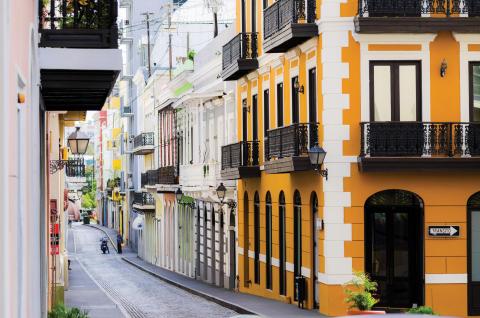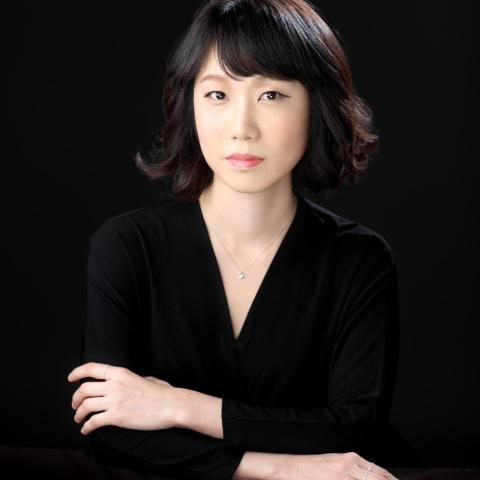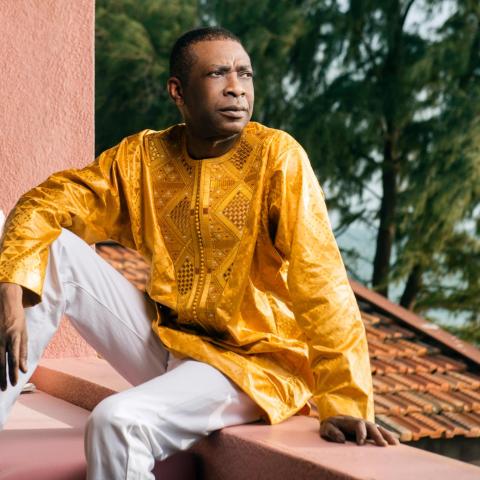A Rising Star

Puerto Ricans have a saying about themselves, an adage they’ve had too many reasons to repeat over the past couple of years: Puerto Rico se levanta. Puerto Rico rises.
Hurricane Maria, the ongoing debt management, and this summer’s political protests have all concussed the island, but Puerto Ricans get up, dust off, and press on.
Take Rubén Amador B.M. ’01, for example. When his contemporary-music school, Conservatorio de Artes del Caribe, folded in 2005, four years after its opening, Amador rallied and relaunched it in 2009. Then, when Hurricane Maria forced CAC to shutter shortly after the school became a Berklee Academic Global Partner, Amador held classes in a preschool that still had a power source. And this July, when police stood directly in front of the CAC to stop protestors from reaching the governor’s mansion, Amador allowed his classrooms to be used as the press center for journalists who came to the island.
“In light of everything that’s happened here the past two years, the fact that CAC is still standing is huge,” says Jason Camelio, Berklee’s assistant vice president for Global Initiatives. Not only has CAC survived, Camelio says it’s hitting its stride, thanks to the irrepressible talent native to the island and to the Berklee ecosystem that helps nourish it.
Uncertain Beginnings
Amador’s rich relationship with Berklee got off to, well, a chilly start. While still in high school, he came to Boston with his father to see the college. His first encounter with it was when he emerged from the Hynes train station into a frosty February day. He had never been to New England in wintertime. “I remember saying, ‘Wow, this is for serious people,’” he says with a laugh.
When Amador opened the door of 1140 Boylston Street, he was greeted with jazz. He assumed the music was a recording but as soon as he rounded the corner, he saw that it was coming from a rehearsal hall. Stunned, he thought, “I want to be here,” as a student.
That day would come a few years later. With a partial scholarship in hand and some transferable courses on his transcript, Amador packed his two congas with clothes; rice and beans; a toaster oven; and an air mattress and boarded a plane to Boston. Initially, he stayed with saxophonist Miguel Zenón B.M ’98, whose place was dubbed “el hotel” because of the number of Puerto Rican musicians rotating through it.
Amador pursued a jazz composition major but says one of his major lessons at Berklee happened outside the classroom, during his interactions with other students.
“That’s where I realized that I’m Latin American,” he says. In Puerto Rico, he had a jazz group; at Berklee, he started listening to Latin American music and founded his band, Yahuba, which means “music” in Taíno, the extinct language of indigenous Puerto Ricans.
Another life-changing realization he had at Berklee was that he wanted to start a music school back home. He spent the summer after graduation in Boston preparing to launch his school, and three days after he moved back to San Juan, he signed a lease for his new school. He started with eight students, four of whom were family members. Within two years, the school had grown to nearly 80 students. Amador had found his passion.
“You start doing it, and then you get into it, and then you see what you have done, and then you see how much enjoyment you have got out of that, and that’s when I got hooked,” he says.
The Long Courtship
Amador knew early on that he’d like his school to be a member of what was then called the Berklee International Network (now Berklee Global Partners). In 2003, he started exploring the idea with Larry Monroe, who was then Berklee’s associate vice president for international programs.
However, in 2005 a cash flow problem forced Amador to make what he called the hardest decision of his life: to close CAC. Afterward, he began studying in San Juan for a master’s degree in cultural studies, including the history of Puerto Rican music. (He’s now working toward his Ph.D.)
But his dream of running a school never left him. Even to him, reopening seemed like a preposterous thing to do considering his circumstances. “But more than crazy, it was a challenge. I said, ‘Okay, you’re feeling very creative? Let’s throw in a challenge. Let’s see if you are creative enough to open a music school without money, and without credit, and just by yourself,” he says.
He took his time designing the school’s second incarnation, and he was able to acquire space in a building in exchange for repair work. In 2009, CAC se levantó. CAC rose.
Over the years that followed, Camelio and Amador restarted talks, and a long period of monitoring and negotiation, CAC became a network partner in 2013. “I guess I cried, I dunno,” Amador says. Then he set his sights on becoming an academic partner, meaning that CAC students would be able to transfer a limited number of credits to Berklee.
For a school to be granted this type of partnership, it needs a history of producing students who do well at Berklee; a track record of proven quality; and a strong, independent brand. “It can’t be based on our brand. It has to be you’re going to that institution because it’s recognized as being an excellent place to study,” Camelio says.
As for CAC’s local reputation, Camelio says that he’s met students “who come from across the island—their parents drive them two or three hours to get to class.” They are drawn by the quality of the program, which focuses on contemporary music but also teaches the students the fundamentals of ear training, music theory, harmony, and arranging, among other topics.
In 2016, after what Amador called “a long courtship,” CAC was granted an academic partnership that allows students to transfer up to 16 credits to Berklee; the program takes about two years to finish. As of last fall, 13 CAC students had completed the credit track. This fall, five more are coming to Berklee.
Vocalist and guitarist Andrea Beltrán from Cayey, Puerto Rico, has been studying at CAC for two years and was recently accepted to Berklee. She hopes to come in fall 2020. “In terms of studying and musically, and also technically, I do feel extremely prepared in comparison to a lot of my other colleagues that didn’t go through CAC, because I have a guide; I have a mentor.”
The Berklee Ecosystem
In addition to being a CAC student, Beltrán was one of the 206 young musicians who took part in Berklee in Puerto Rico, a weeklong program of classes with Berklee faculty. Amador, who first studied in the program in 1995, when he was 17, now produces and directs it, with the help of several CAC students.
Luis Alvarez B.M. ’83, a former Berklee trustee who runs the nonprofit Make Music Happen, is also instrumental in putting the program in Puerto Rico together. His group secures sponsors and manages facilities, equipment, and marketing.
Alvarez says the island is flush with amazing talent, but that this talent needs to be shaped. “[These musicians] need programs like this that will allow them the opportunity to really express themselves, learn about what it takes to become not only a great musician but to go into music business, music therapy, music education. And there’s no other place like Berklee College of Music to do that,” he says.
More than 3,800 students have attended Berklee in Puerto Rico since it started 25 years ago, and Berklee has awarded about $12.5 million in scholarships to summer programs and full-time study over that time. The program is such a pipeline to the college that about 75 percent of all Puerto Rican students at Berklee have attended it.
This May, the level of students was exceptionally high, Camelio says. Part of the reason for this is that CAC students keep getting better. The school now has about 40 students and 10 faculty members, four of whom are Berklee alumni.
“We’re just now seeing more Berklee graduates coming back and becoming part of their faculty, and that’s when you start to see the switch,” he says, referring to the tipping point at which this feedback loop has a turbo effect on CAC’s educational quality.
“It’s like a big ecosystem,” Amador says.
Indeed, the program that took root a quarter-century ago is now bearing even more fruit, and with the rich talent coming from CAC, each year’s musical crop rises to new heights.




